#America's Regiment
Explore tagged Tumblr posts
Video
#TOG#Nation's Capital#America's Regiment#Ceremonial Excellence#Honor the Fallen#armynewswire#Arlington#Virginia#USA#flickr
2 notes
·
View notes
Text
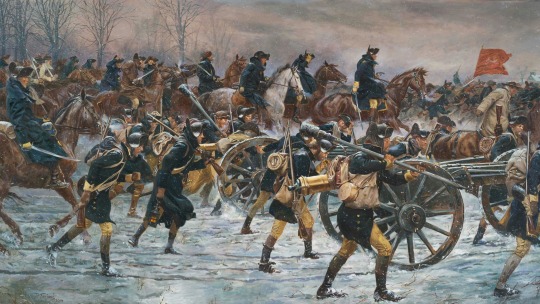
Victory or Death, Advance on Trenton by Don Troiani
#don troiani#art#american revolution#american revolutionary war#alexander hamilton#george washington#artillery#cannons#history#american#america#north america#continental army#trenton#virginia regiment#flag
59 notes
·
View notes
Text
#OTD in 1861 – The 10th Tennessee Infantry Regiment enters Confederate service in the American Civil War.
Company D was known as the ‘Rebel Sons of Erin’ because so many of them were Irish. Indeed, the roster of Company D reads like any small town in a 19th century Irish village (every surname was Irish). While the Fighting 69th on the Union side is the most famous “Irish Brigade,” it is estimated that at least 30,000 Irish fought on the Confederate side. Much of the enlistment was due to the…

View On WordPress
#America#American Civil War#Confederate#General Patrick Cleburne#Ireland#Patrick Cleburne Painting by Richard R. Miller#Tenth Tennessee Infantry Regiment
64 notes
·
View notes
Text
oh my god stop everything. invaders read is cancelled, giant size invaders cancelled, i am reading baby bucky in fucking chronological order


HE HAS A LITTLE BABY UNIFORM.........GOSH GEE WHIZ GOLLY
#THANK YOU FERALKIDBUCKY FOR THE INFORMATION#HE'S SO SMALL......#i have a fever and am mildly delirious so this is of course making my entire day oh my god. look at him. i might cry#kayvscomics#Captain America Comics (1941) issue 1#1941.....what am i doing.........but he's so cute lookit his little uniform. he's the mascot of the regiment. i love him so much
17 notes
·
View notes
Text

Howdy, Mr. Bucky Barnes! How’s our rollicking regimental mascot today?
(Captain America #256)
#captain america#steve rogers#bucky#james bucky buchanan barnes#flashback#regimental mascot#bill mantlo#gene colan#marvel comics#comics#80s comics
9 notes
·
View notes
Text

#doc martens#fuzzy#kiltedcub#regimental#kilted#men in kilts#serialkilter#leather masters kc#chappell roan#Nakedin America tour
10 notes
·
View notes
Text
What Does ANTIFA Mean? Why Should We Care?
This is what the United States really looks like, United Humanity, not only white Americans. “ANTIFA” is a philosophy, not a group of people. It means “Anti Fascist.” What does is mean to be a Fascist? Fascism means: a form of extreme-right authoritarianism ultra nationalism characterized by dictatorial power forceable suppression of opposition strong regimentation of society and the…

View On WordPress
#Anti Fascist#Antifa#authoritarian#authoritarianism#citizens#Constitution#Constitution of the United States of America#democracy#dictatorial#disctatorialpower#economy#fascist#Free Will#freedom#global warming climate change#human rights#immigration#liberty#nationalism#news#opposition#power#Preamble#right-wing#rights and priviliages#society#strong. regimentation#supporession#trafficking#truth in lending
0 notes
Video
youtube
Lynn D. "Buck" Compton Words of Wisdom ...
Lynn D. "Buck" Compton was a World War II veteran who served as a Second Lieutenant in Easy Company, 2nd Battalion, 506th Parachute Infantry Regiment, 101st Airborne Division. He was also a prominent figure in the HBO miniseries "Band of Brothers," based on Stephen E. Ambrose's book. Compton was known for his courage and leadership during the war, as well as his contributions to the legal profession after returning home.
#Youtube#America#Lynn D. Buck Compton#wwii#veteran#easy compton#Band of Brothers#2nd Battalion#506th Parachute Infantry Regiment#American#Second Lieutenant#Tumblr#instagram#twitter X#X#facebook#Motivate and Inspire#Motivate#Inspire
1 note
·
View note
Text
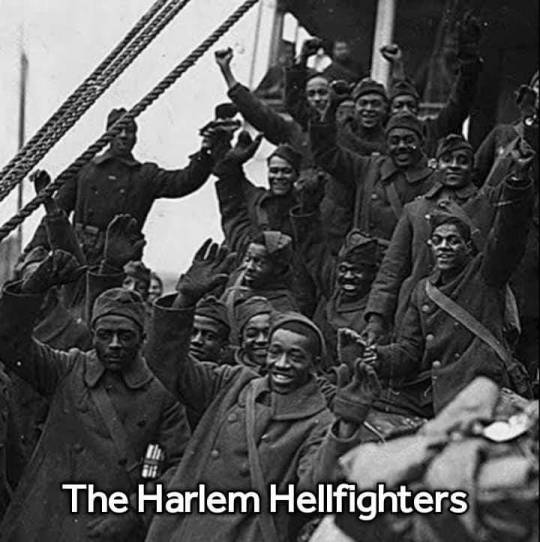
Who are the Harlem Hellfighters?
Also known as 369th Infantry Regiment, they were an African-American unit that served 191 days in combat during WWI more than any other American unit. They broke barriers and returned home as one of the most decorated American combat units serving in World War I.
The French called them the “Men of Bronze” out of respect, and the Germans called them the “Harlem Hellfighters” out of fear and for their intensity on the battlefields. They were known for their toughness and the fact that they never lost a trench, foot of ground, or a man through capture to the enemy.
The extraordinary courage of the Harlem Hellfighters earned them fame in Europe and America as newspapers recounted their remarkable feats. They are celebrated for their bravery, courage, and dedication to their country.
Although, due to severe racism and segregation that existed in post-war America, it created some problems for veterans of the unit.
723 notes
·
View notes
Text
Linked Universe AU Directory
Anyway, I didn't put every single AU on this thing. I do not have the time and energy for that because there's over 600 LU works tagged as alternate universes on Ao3. I did follow some general guidelines when I was deciding which works to add, the most important one being that the AU had to be more than just canon divergence and had to affect all the characters equally. Feel free to add onto this post, if you think something is missing.
Link to the Ao3 Collection
Age Swap | Age Shuffle AU
Apocalypse - Unspecified | Brothers In Arms
Apocalypse - Zombies | Autolysis
Apocalypse - Zombies | LU Zombie AU
Fae | Across the River
Fae | Flower Garden
Fae | From Open Seas, to Dark Tangled Depths
Folklore | If You Thought This Was Gonna Have a Cool Title, You Obviously Don't Know Me
Fusion - Alice's Adventures in Wonderland | Hyrule's Adventures in Wonderland
Fusion - Among Us | Good Riddance
Fusion - Atlantis: The Lost Empire | The Sage's Journal
Fusion - Big Hero 6 | Fierce Hero 9
Fusion - Captain America: Civil War | United We Stand, Divided We Fall
Fusion - Dungeons & Dragons | LU x DnD Crossover
Fusion - Full House | Full House AU
Fusion - Lethal Company | Linked Company AU
Fusion - Lethal Company | Linked Universe AU: Lethal Company
Fusion - Mad Max | And the World Ends Again
Fusion - Monstrous Regiment | Linked Regiment
Fusion - Nailed It! | You Really Nailed it Right There, Buddy!
Fusion - Pokémon | LU Pokémon AU
Fusion - Pride and Prejudice | Pride and Prejudice but it's a Fair-Play Whodunnit
Fusion - Tangled | LU Tangled AU
Fusion - The Hunger Games | LU Hunger Games AU
Fusion - The Incredibles | Linked Universe Incredibles AU
Fusion - The Secret World of Arrietty | The Secret World of Wild and Twilight
Fusion - Spirited Away | One Summer's Day
Fusion - Star Wars | Tales of Courage from Across the Galaxy
Fusion - Warrior Cats | Faronclan AU
Gods & Goddesses | And the Universe Said "I Love You"
Heist | Heist AU
Historical - 1800s | City of Light and Dark
Historical - Supernatural | 1931
Science Fiction - Space Crew | Linked Nexus
Mermaids | Flared Fins
Miscellaneous - Disability | Shatterproof
Miscellaneous - Intrigue | Castle Intrigue
Miscellaneous - Magic | We Could be Immortals
Miscellaneous - Unspecified | Eyes Wide Open
Miscellaneous - Unspecified | Manus Lupus
Modern | Adoption AU
Modern | Good Enough
Modern | In the Heart of Hyrule
Modern | LU Modern AU
Modern | Modern Zeldas AU
Modern | Ranch House AU
Modern | The Many Realities of the Hero Spirit and Modern Living
Modern | The Roadtrip AU
Modern | The Weather Outside is Frightful
Modern - Actors | Linked Universe Actor AU
Modern - Coffeeshop/Café | Looking for Group
Modern - College/University | All You Need to Know
Modern - College/University | Linked University
Modern - College/University | Oh No, They're Theater Kids Now
Modern - College/University | RIP
Modern - Emergency Services | Of Officers and Stuffed Elephants
Modern - Farm | Fresh from the Farm
Modern - Ghost Hunters | A Haunting in Hyrule
Modern - Healthcare | How to Save a Life
Modern - Healthcare | LU in Healthcare
Modern - Magic | Everything but Blood
Modern - Magic | Family is Made of...
Modern - Magic | Maybe Human
Modern - Magic | Summer Camp Lon!
Modern - Magic | The Chain that Binds Us
Modern - Magic | Wild's Magic Shop AU
Modern - Monsters | Here There Be Monsters
Modern - Movie Theater | There's a Remlit... Loose in the Theater!
Modern - Music Camp | Linked Repertoire
Modern - Newsroom | BSX: Hyrule SatellaNews
Modern - Newsroom | Professions and Professionals
Modern - Office | Linked Corporations
Modern - Opera | Opera House AU
Modern - Retail | The Hot Topic Debate
Modern - Retail | What Goes Down at Festival Foods
Monsters | Seelies and Selkies
Murder Mystery | How to Kill a God
Post-Nuclear War | Chain Reaction
Royalty | Every Other Star
Royalty | I'll Be There
Royalty | Royal Links AU
Royalty | Lost Prince AU Part 1 & Lost Prince AU Part 2
Soulmates - Platonic | Marks on Your Body, Marks on Your Soul
Soulmates - Romantic | Castle Town Coffee Shop
Vigilantes | Empty Streets Full of Life
Vigilantes | We Will Find You, Wherever You Are
Wings | Four's a Dad!?
Wings | Wings AU
Wings | Wing Bois
181 notes
·
View notes
Text
My Thoughts on Jenny Nicholson and the Star Wars Hotel
I watched Jenny Nicholson's four-hour "The Spectacular Failure of the Star Wars Hotel" video essay that YouTube showed me recently but which till now I couldn't bring myself to construct a day around. She's in great form here, and I'm pleased to say I go back as a fan of her work all the way to her Friendship Is Witchcraft days. (Blows my mind that she voiced all Mane Six characters, and others, so well.)
Anyway, long story short, Disney built a Star Wars hotel at Disneyworld in 2022 that was themed as a voyage on a spaceship, then proceeded to charge thousands of dollars per person per night, the most expensive publicly-available Disney theme park hotel experience by miles and miles, and then closed the hotel in 2023 after having spent hundreds of millions of dollars. Jenny went into the experience as a member of the core target demographic and spent four hours talking about all the ways it was an underwhelming or outright disappointing experience.
Her video reminded me of Hasbro's own misadventures in corporate greed with Magic: The Gathering, which has suffered in recent years from price increases, disengagement from the fan community, and a huge proliferation of product spam—i.e. more products overall, more ways to buy a given product (e.g., the proliferation of different boxes, which eventually killed the original draft booster box that had powered Magic for 30 years), and more variants of individual cards within and between products.
Hasbro and Disney are very similar in the economic space they operate in, and also utilize similar business strategies. Disney is essentially the S-tier megacorporation to Hasbro's B-tier, and we have seen many of the same corporate trends play out in both companies.
When it comes to Disney theme parks, they have massively increased ticket prices over the years, well beyond the rate of inflation, and have also implemented advance-scheduling systems for faster access to rides that has made the process of exploring a Disney theme park much less spontaneous and a lot more regimented and stressful.
Disney realized, years ago, that their limited number of theme parks—they only really have two, not counting the various sub-parks: Disneyland on the West Coast and Disneyworld on the East Coast—together with Disney's entrenched status as a cultural icon with lots of goodwill and brand recognition among the public, are vastly underserving public demand, allowing them to inflate the price of a single trip almost arbitrarily, well into the four digits—or even the five-digits if you're taking the family and spending several days.
The Star Wars hotel was Disney's "Magic 30": a product so ludicrously expensive as to incur immediate and universal condemnation by their own fans. It's clear to me what Disney was doing: They'd happily turned the conventional price knob up and up and up for years. Now they wanted to experiment with a fundamentally more expensive product class, basically five to ten times more expensive. They wanted to see if the market could support it. Because the growing disparity of wealth in America, together with America's obscene wealth as a nation relative to the rest of the world, means that it's definitely possible: There are definitely millions of people out there who could book a stay at the Star Wars hotel if they wanted to. And Disney was like "Let's see if they will."
And you know what? I think it could have succeeded. Because there really is an obscene excess of wealth in this country, even though most of us don't have any access to it. And we are a culture whose zeitgeist is ever ravenous for the next big, flashy experience.
But instead the venture failed spectacularly. Why? Because such reckless corporate greed is, itself, usually a sign of deep organizational rot and incompetency among the board and executive leadership. In other words, their hotel failed for the same reason they tried building it in the first place: Disney has grown stupid.
The way it failed, going by Jenny's video, is down to two independent reasons:
An outrageous degree of "penny-wise, pound foolish" thinking;
A fundamental failure to anticipate the comfort and pleasure of the guest.
The former is the more obvious of the two, and what really stood out to me as emblematic of it in this whole boondoggle were two simple thing: 1) The hotel rooms didn't have complimentary Disney+; and 2) the free loaner umbrellas for hotel guests visiting the Star Wars Land in Disneyworld were either so worn-out or so shoddy to begin with that, unless it was a big coincidence, both Jenny's and Jenny's sister's umbrella failed while in use. This was in the context of Disneyworld's most expensive customer experience ever, by a lot, and Disney was nickel-and-diming them. Jenny's video goes into a great depth of detail on the dozens if not hundreds of corners they cut; it was basically everything but the food. The result was an antagonistic relationship between Disney and their hotel guests where almost everything interesting cost more money (usually a lot more money) while almost everything included in the main ticket price was of cheap quality or stingy in its allotment. Every aspect of the whole process, from the scammy vibes of booking a room in the first place, to the pathetic after-care for customers who reported a problem after their stay, was likely to leave a sour taste in the customer's mouth.
When you're paying the most expensive prices in the history of a product category, you really just need to be given an up-front price that includes all or nearly all of it. You'll know what you're in for, and you can make an informed decision, and then it's really just down to the host to provide an experience and level of service that matches those high dollar outlays. But instead, as Jenny pointed out, it's like you're dealing with Spirit Airlines, where you're gonna pay a fee for literally everything beyond sitting your body quietly on the airplane.
Mind-boggling hubris. Disney needs to be broken up for the monopoly that it is, and this is just one more example of how convinced of their own inevitability and supremacy Disney has become.
The other main failure on Disney's part is the subtler one.
Jenny focused on how the Star Wars themed choose-your-own-adventure game, which was at the heart of the hotels' central conceit of "live your own personal Star Wars story," was irreparably dysfunctional. Not only was the app, through which most of the "experience" was conveyed, horribly designed; and not only were the tasks delivered through this app mostly busywork to anyone other than young children, consisting of little more than walking around and scanning inanimate objects; but the storyline's entry points and decision points were completely impenetrable through reasonable means, to the point of seeming arbitrary. Jenny proactively tried and failed to get into her preferred storyline; then tried and failed to get into any storyline; then was automatically sorted into one the next morning; and ultimately ended up having only one (dubiously) interactive story experience over the whole weekend.
She talked about how the tightly-regimented and incredibly full schedule was so mentally and physically draining that on the final night she fled her dinner table fearing she would vomit and had to stand in her hotel room staring at herself in the mirror for a while, to understand her illness (which turned out to be stress-induced exhaustion) and center herself.
She talked about how she didn't get to see a much-coveted music show during dinner on her first night because she was seated behind a giant column.
Really, these things are manifestations of the larger and more fundamental failure on Disney's part to anticipate the comfort and pleasure of the guest, as I put it.
As I was watching her video, two thoughts came to me in this vein:
First was that this whole experience really needed to be "playtested," as we might say in Magic. I mean, I'm sure there nominally was, but whatever playtesting they did was completely ineffective. Good playtesting would have brought most of these issues to light.
Second was that the Disney of today has completely lost touch with the namesake of their industry: hospitality. This would never have happened at a new luxury resort by an established world-class hotelier a century ago. Because they understood the basics. Little things, like hot towels.
I could tell just from Jenny's video that this whole hotel was decided from the top-down by soulless, disconnected corporate suits who blatantly disregarded whatever good suggestions I'm sure the Imagineers® came up with. For the failures to be as expansive and ubiquitous as Jenny's video documented, no doubt the institutional rot extends down at least as far as the project manager level, if not down to individual Imagineers® and beyond, but there have to be at least some good ones, and clearly they were overruled early and often. Whenever Disney's leadership was faced with a decision between anticipating the comfort and pleasure of the guest, and saving a couple bucks on a guest who was literally laying out several thousands of dollars to be there, leadership chose the latter.
They were so arrogant that they believed, without noticing or questioning it (unless Disney's leadership is in fact cartoon evil), that they would tell the customer what constitutes a good experience, and the customer would pay top dollar for it. And so you get a guest experience where customers who are actively trying to pick a given storyline can't get any storyline and are later seated for the dinner show behind a giant fucking column.
It's sad, and we should all be glad that their hotel failed. Not that Disney is likely to learn the right lessons from their failure, but the long-term solution here is for leisure dollars to be directed toward other companies. For the several thousand bucks that Jenny paid, she could have had a true luxury vacation in most parts of the world—and for longer than two nights.
One thing that I noticed during the four hours of her video was that Disney, or at least the people in charge of developing this hotel, didn't seem to understand what constitutes an enjoyable story experience. I am forgiving of the low level of complexity in the various puzzles, since the public is famously stupid plus a lot of these guests are going to be children. But there was so little imagination in the actual plot beats: Chewie sneaks in, gets arrested, and busts out. You get to help some Resistance fighters smuggle their luggage. Like, it's insipid. I mean, ultimately, most pop storytelling is insipid, but what I mean is that the dressings were insipid too. Dressing a story up is what makes stories great, at least at the mainstream level. There was no pomp and flourish; no clever interweaving; no electric events that put people on the edge of their seats. Just walking around on your phone for two days scanning crates and occasionally being in the same room while somebody busts Chewie out of the clink—assuming you even make it to the story events in time, since they often fired early.
The whole thing smacks of rule by committee, too many cooks, and suits suits suits all the way down.
I think it's a sign of the times that this is happening. We are once again in Robber-Baron territory in this land. The big corporations and the oligarchs who run them have become so obscenely rich and so utterly disconnected from ordinary life, and their corporate cultures have become so masturbatory and so officious, that they are increasingly creating products for idealized, phantom audiences. They increasingly don't understand real people or real life.
And we can and should bring the weight of the government down on them, more to break up monopolies and allow new and established competitors to seriously challenge them than to actively punish these companies for making money, but even more so we just need to spend our dollars elsewhere. I mean, I'm speaking hypothetically here; I am poor so none of this even applies to me in the first place.
Hence why, even after inflation, this is still just my two cents.
184 notes
·
View notes
Video
9 notes
·
View notes
Text
MCU Timeline: Captain America: The First Avenger
March 10, 1917 - James Buchanan Barnes is born.
August 15, 1917 - Howard Anthony Stark is born.

July 4, 1918 - Steven Grant Rogers is born.
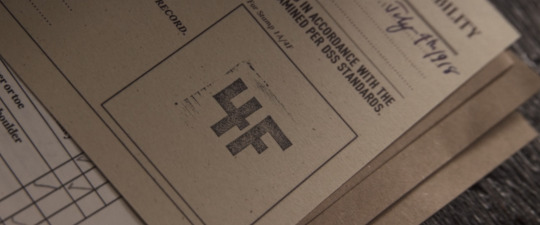
April 9, 1919 - Margaret "Peggy" Carter is born.
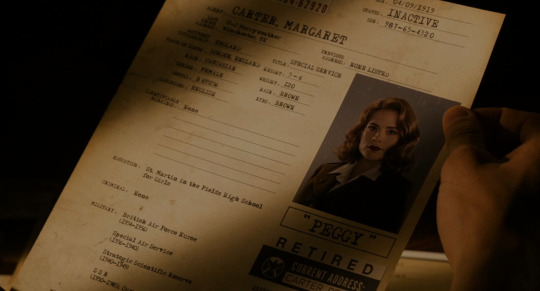
Why 1919 (deleted scene from The Avengers) and not 1921 (Agents of S.H.I.E.L.D.), as stated in Wikipedia: Agents of S.H.I.E.L.D. is not canon for the MCU (events of the show take place in another universe, where Peggy was born in a different year and had a different background).
1934-1936 - young Peggy serves as a nurse in the British Air Force.
1936-1940 - Peggy serves in the Special Air Service.
1940:
Peggy joins the Strategic Scientific Reserve.
Howard founds Stark Industries and becomes its CEO.
May 1941 - Steven Rogers attends a Dodgers vs The Phillies baseball game at Ebbets Field, Brooklyn.
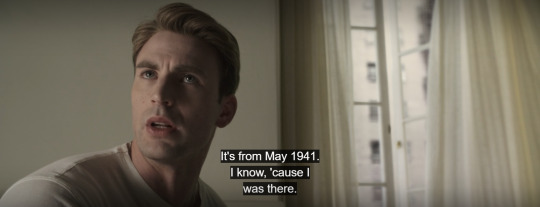
March 1942 - Red Skull invades Norway and extracts the Tesseract.
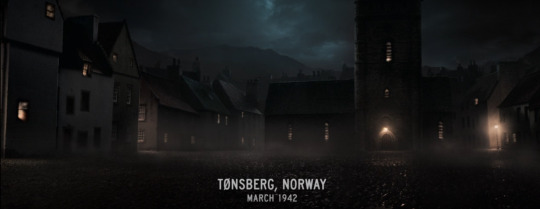
1942/1943 - The Allies receive a gift from Wakanda: Vibranium. It is given to the SSR's Head Engineer - Howard Stark.
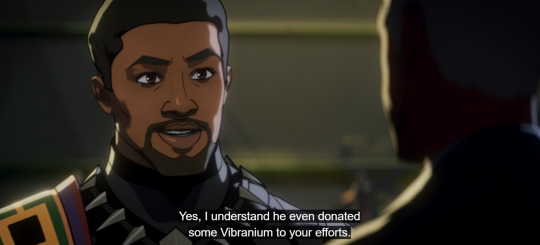
1943:
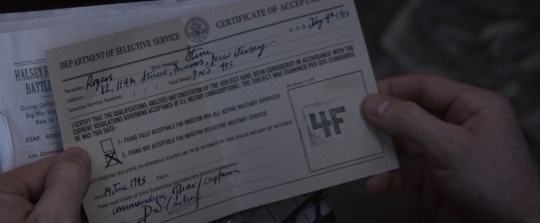
June 14:
13:50 - Steve gets his last 4F.

And his last beating in the alley a couple of hours later.
Evening - he and Bucky go to the "World Exposition of Tomorrow", where Howard demonstrates his (almost) flying car. Steve meets Dr. Erskine and gets a (falsified) 1A.
June 15:
Sergeant James Barnes heads to Europe with the 107th Infantry Regiment.
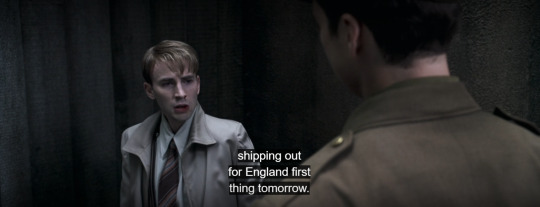
Candidate Rogers begins his trial week for Project Rebirth at Camp Lehigh in NJ.

June 21 - Dr. Erskine makes his choice and informs Rogers. They talk about it, about the serum and HYDRA.
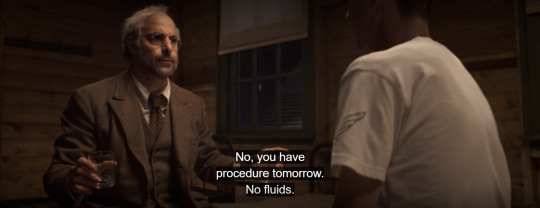
June 22, morning - Steve becomes a super soldier. Erskine is killed. The last vial of serum is destroyed.
June 23:
Rogers is offered a position in the USO theater (to help sell war bonds) and receives a (fake) rank of captain.
Night - SSR (including Peggy and Howard) is being retasked to fight HYDRA and goes to London, UK.

July-October - Captain America's US tour (over 200 performances).
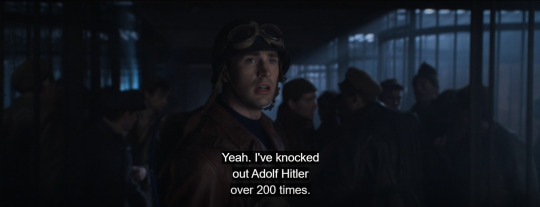
November 3rd:
Captain America show in Italy.

Night - Steve goes behind the lines to a HYDRA camp in Austria to rescue Bucky with the help of Peggy and Howard.
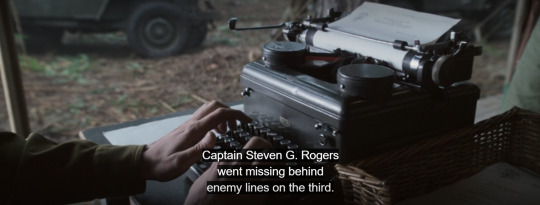
November 5th - he returns with 400 (CATFA) or 163 (CATWS) liberated soldiers.
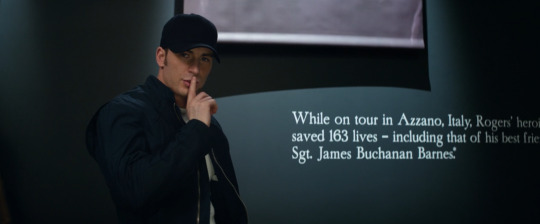
A couple of days later - SSR in London. Based on the locations of HYDRA bases remembered by Rogers, they develop a plan to combat HYDRA. Steve puts together a team.
Marvel Studios' mistake: the medals and badges Steve wears don't make any sense at this particular moment. He simply had neither the time nor the opportunity to earn the Combat Infantry Badge, or the Presidential Unit Citation Badge, nor could he receive the American Defense Service Medal.

Next day, 8 am- Steve meets with Howard and receives his vibranium shield.
1944:
November 1943 - November 1944 - Howling Commandos destroy HYDRA weapons factories.

December 1944 - January 1945 - attack on the train with Dr. Zola. Bucky falls from the train from a great height and is declared killed in action. Zola is captured.

1945:
Soon after, early January - the Valkyrie is finished and ready to attack major US cities. SSR receives information about the location of HYDRA's main base in the Alps and heads there.
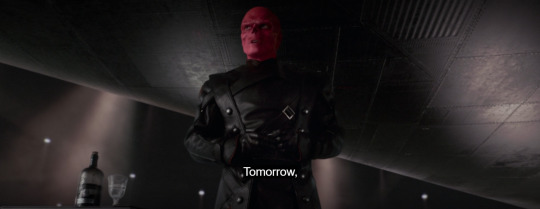

Next day - SSR attacks HYDRA's main base. Red Skull teleports to Vormir. The Tesseract is lost in the Arctic Ocean. Crash of the Valkyrie. Steve goes into suspended animation.
After January 1945 - Howard Stark leads expeditions to find Rogers. He finds the Tesseract, but not Captain.
March 23, 1945 - Case №17 is opened. James Barnes "joined" the HYDRA branch in the USSR.

May 8, 1945 - VE-Day.
Spring-Summer 1945 - Howard is involved in the Manhattan Project.
1946:
December 1945/January 1946 - Peggy is assigned to the SSR office in New York.
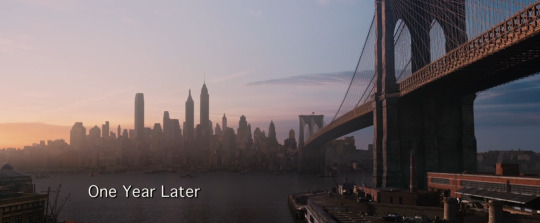
March 1946 - events of "Agent Carter" one-shot.
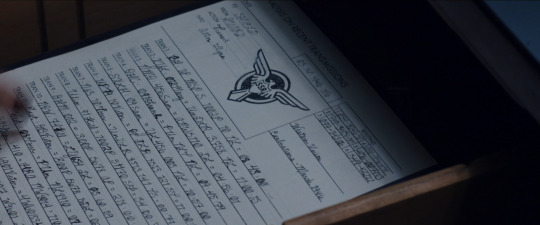
2012:
Early 2012 - 67 years later, Steve Rogers is found frozen but alive.
April 2012 - Rogers wakes up in the S.H.I.E.L.D. recovery room in New York City.
Iron Man (2008) Timeline
The Incredible Hulk (2008) Timeline
Thor (2011) Timeline
The Avengers (2012) Timeline
#marvel#mcu#steve rogers#captain america#bucky barnes#james barnes#mcu timeline#captain america the first avenger#captain america the winter soldier#agent carter#peggy carter#howard stark
67 notes
·
View notes
Text
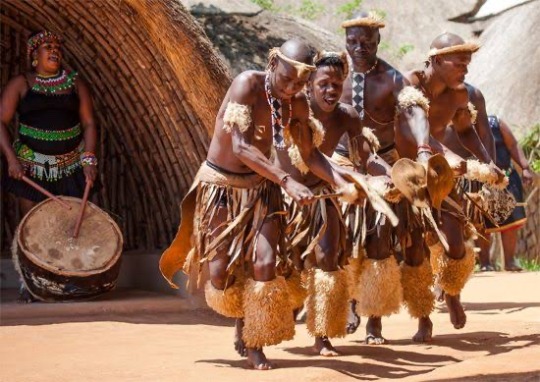
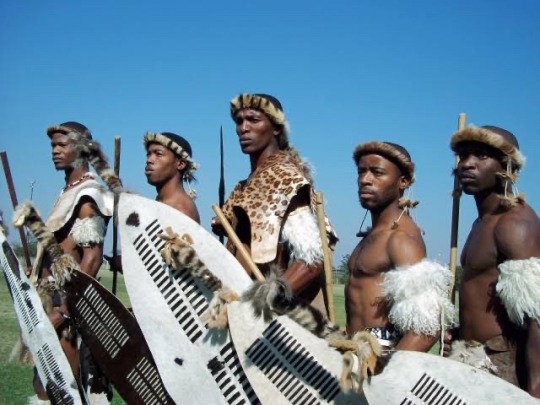
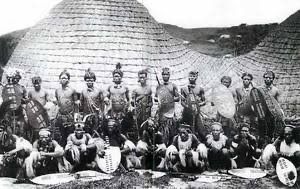
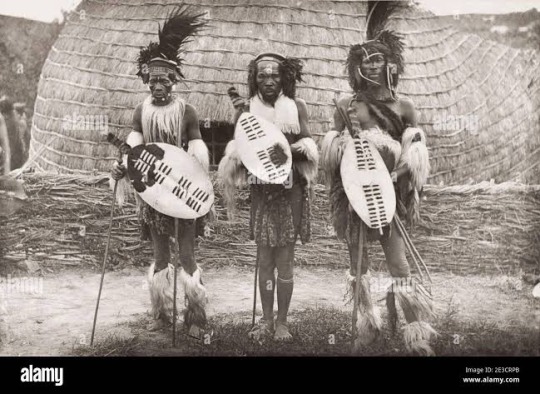

Black history is not all about slave trade
Slave trade is not just black history it’s just 10% of the history africa holds
This is a message to my black brothers and sisters in America
Today I will be talking about the Zulu tribe
The ancestors of the Zulu migrated from west Africa into southeastern Africa during the Bantu migrations from 2000 BC until the 15th century. The Zulu tribe expanded into a powerful kingdom, subdued surrounding groups, and settled in the region known as KwaZulu-Natal in present day South Africa. After enduring colonialism and overcoming apartheid, they have emerged as the dominant ethnic group in South Africa todayAccording to Zulu ancestral belief, the first Zulu patriarch was the son of a Nguni chief who lived in the Congo Basin of Central Africa. By the early 1800s, the Zulu had migrated to Natal, where they lived among other Nguni-speaking chiefdoms. There were ongoing power struggles among these chiefdoms.Around 1808, Chief Dingiswayo of the Nguni-speaking Mthethwa people led wars of conquest to end the power struggles among the chiefs in the communities surrounding his chiefdom.Chief Dingiswayo centralized power by organizing the military into age-based groups, rather than lineage-based regimens. This weakened kinship ties of the conquered communities. Chief Dingiswayo left the conquered chiefdoms relatively intact after they accepted his dominion.The Zulu developed into a distinct cultural group by the time they were conquered by Chief Dingiswayo and his Mthethwa people in the early 1800s. At that time, the Zulu were a small lineage numbering around 2,000 people led by Chief Senzangakhona.Shaka, the future founder of the Zulu Kingdom, was the illegitimate son of the Chief Senzangakhona. Shaka was drafted into the Mthethwa and became one of Chief Dingiswayo's bravest warriors. When Chief Senzangakhona died, Shaka seized the Zulu throne.Using Dingiswayo's military style of weakening kinship ties amongst warriors, Shaka controlled the Zulu community. After Dingiswayo's death, he killed the legitimate heir and installed a puppet as Chief of the Mthethwa.Before long, Shaka seized control over Mthethwa's regiments and assumed power of the newly formed Zulu Kingdom in 1818.
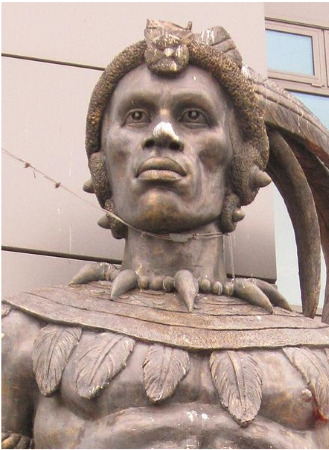
Shaka, Zulu King 1818 to 1828.
Zulu tribe facts include the following:
Shaka Day is celebrated in September by slaughtering cattle, wearing traditional clothing, and wielding traditional weapons. Dignitaries from other tribes and nations attend.
Traditionally a senior male is the head of the clan. Young men train from childhood to fight and defend the clan. Members of the clan have kinship ties based on blood or marriage.
To show respect, the Zulu do not refer to elders by their first name; they use "Baba" meaning father, and "Mama" meaning mother.
Patrilineal inheritance and polygamy are practiced in Zulu culture; having more than one wife is acceptable if one can afford it.
In Zulu culture, bride wealth must traditionally be paid in cattle. Most native groups in South Africa, including Nguni-speaking Xhosa, Ndebele, and Swazi pay bride wealth.
#life#animals#culture#black history#history#blm blacklivesmatter#heritage#africa#biden is obama's puppet#england
631 notes
·
View notes
Text
The Lifestyle of Nikola Tesla
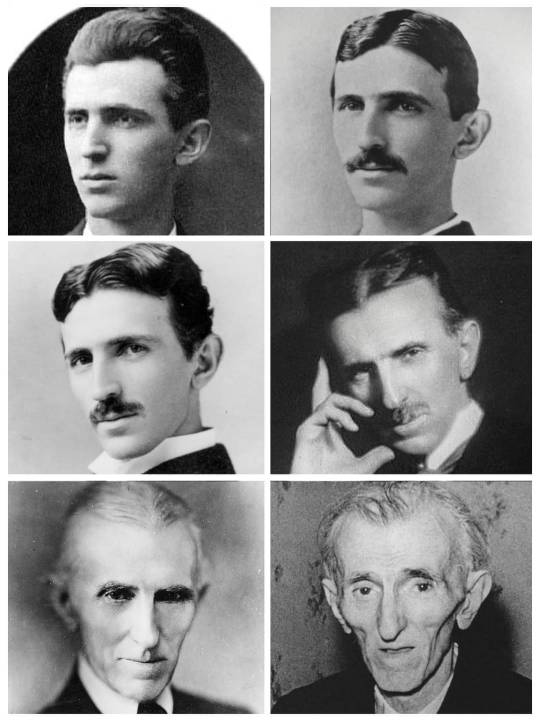
Nikola Tesla was a very tall and skinny man, standing over six feet and weighing around one hundred and forty pounds. He had light blue-gray eyes, which was considered odd because he was of Serbian descent who were typically known to have darker eyes. Tesla, probably joking, said to a reporter that his eyes used to be dark, but using his mind so much had made them many shades lighter. The inventor was known to be very elegant, stylish, meticulous in his grooming, clothing, and regimented in his daily activities.
Tesla never married and remained a celibate and a bachelor his entire life. Tesla was solely committed to the principles of science above all else, and for this reason, he denied the love and companionship of a female counterpart. He chose to lead a solitary life, hoping only that this sacrifice to work would make his name live on through many centuries still to come.
One of his few hobbies other than work was feeding birds. Tesla’s respect for birds began when he was a child growing up in the Austro-Hungarian Empire. He and his local friends made a sport out of catching live birds, and when Tesla himself caught a couple of keepers, he and his friend found themselves getting attacked by a murder of crows. The revolt forced the boys to release the birds and take cover. In America, he made it a specialty of his to treat sick pigeons, which seems odd because he was quite the germaphobe. He would feed them every day on his daily walks and would also take in wounded pigeons and nurse them back to health at his hotel in New York. He seemed to have had a better connection with birds than with most people. In 1917, he was awarded the Edison Medal, and upon receiving the award, the inventor could not be found. He was later found feeding pigeons near a local library and was persuaded back to the ceremony to give his speech.
Tesla suffered from an obsessive compulsive disorder, and because of this, he developed some very strange idiosyncrasies and phobias, such as having a strong dislike against earrings, pearls, peaches, and touching other people's hair. He counted the steps in his walks and calculated the cubical contents of soup plates, coffee cups, and pieces of food. All repeated acts or operations he performed had to be divisible by three.
While living in New York, Tesla kept his laboratories absolutely clean and pure, refused to touch other people, would wear gloves while shaking hands, and insisted upon personally cleaning his own plates and silverware at restaurants with his requested 18 napkins. This cleanliness was all intentional because, as a child, he almost died from cholera, which raged in the region of his hometown Lika due to contaminated water. Many found Tesla’s actions strange, but to him, it was a very important measure to protect his health.
In another way to keep his body clean and pure, Tesla invented an electrical apparatus that could give the human body a dry bath by passing millions of volts of electricity through it (similar to his demonstrations in the early 1890s where he passed electricity through his own body). His oscillator was a small, drum-like object about two feet long by one foot wide and could apply half a million volts of electricity through his body. The large amount of electricity would affect the germs without destroying the cells of the tissues of the body. Though his oscillator seemed like a fountain of youth, Tesla maintained his conventional ideas of health. He bathed daily, believed in plenty of exercise, and would walk eight or ten miles every day. He said that he never would take a cab or other conveyance and relied on his leg power for transportation.
His diet was a crucial part of his daily routine to remain healthy and to prolong the length of his life. He was very fussy and particular about his food: he ate very little, but what he did eat had to be the very best. He wasn’t a complete vegetarian; he ate meat, just not very occasionally (perhaps once or twice a year). He did believe though that humankind should move towards a vegetarian diet, not just because eating meat the way we do is “barbarous,” as he said, but because he believed the vegetarian diet is more beneficial to the human body.
In his later years, he never smoked, drank tea, coffee, alcoholic beverages, or consumed any other stimulant. Since he saw life through the lens of his mechanistic theory of life, he took great care of his body as if it were a machine properly maintaining its best efficiency.
As for sleep, Tesla reported that he was a poor sleeper and had very unusual resting patterns. He claimed to only sleep a few hours each day and would oftentimes practice polyphasic sleep where he would take short naps for restoration instead of sleeping for a long period of time.
Unfortunately for Tesla and his clean and healthy lifestyle, in 1937, at the age of 81, he was hit by a taxicab during one of his regular walks. It is likely he was jaywalking because he admittedly was known to do so. He broke three ribs and seriously injured his back. Tesla would be bedridden for months while refusing to see a doctor, and on top of this would catch pneumonia, which would plague his health for the last 5 years of his life. I believe this accident and sickness would play a major role in the rapid decline of his health, both mentally and physically, and his goal of living past a century would never be realized.
Nikola Tesla had a unique and eccentric lifestyle and was known for his intense work habits, often spending long hours in his laboratory. So much so that his friends would seriously worry about his health. Financial difficulties were a recurring theme in his life, and he died in relative obscurity. Despite these challenges, Tesla's legacy is marked by his groundbreaking contributions to the field of electrical engineering.
229 notes
·
View notes
Text
Yesterday was quite a day, I mused as I hurried back from the medics: I caught diarrhea and voted for Roosevelt. Now I was bound for the barn on the west side of Uden where we had moved from an outpost in the north several days after returning from Best. The ballot had gone on its way to the States, but I still had the diarrhea; it made me hurry faster. The first platoon had taken over a large barn and made itself at home in the hay. Supposed to be on the M.L.R., we had posted a couple of men on 24-hour guard in the field behind us while we slept on soft hay in thin, one-man sleeping bags which had caught up with us with the last of the regiment’s rear echelon. It was our most comfortable position in Holland. But I couldn't enjoy it, because I had the worst diarrhea I had ever caught in the Army; I couldn't lie still for more than twenty minutes. Cramped and irritable, I had spent most of the day and night running back and forth to the slit-trench latrine behind the barn, with time out for a mile walk to the medics and a dose of sulfa pills. It was all the cooks’ fault, I mused as I came in sight of our quarters. Bastards always were dirty. They kill a cow and butcher it and boil it hard in pasty gravy and call it beef stew. It almost broke my teeth, but the stew wasn't to blame—it was the wash water afterward. Vile as the British seamen on the Samaria, who had set out cold pans of salt water for us to wash our mess kits in, they gave us a single garbage can of soapy water as a battalion rinse. By the time I got to the can, the scum was an inch thick on top. The grease clung to my pan, breeding germs, and gave me diarrhea at the next meal. I had spent last night on the run, unable to enjoy the comforts of my sleeping bag. Well, anyway I had voted. That made me happy. I had to walk almost two miles to cast my ballot, but I would have walked ten, if necessary, because this was my first vote—I was 22 in June—and I had always wanted to cast it for Roosevelt, the greatest President we had ever had and the only one who ever gave the working man a break. Roosevelt had faced and overcome the two great crises America had ever suffered: the worst depression in history and the world’s biggest war. He was a politician, as crafty and conniving as any, for politics is a cesspool of lying lawyers, but his work was greater than the man, and the country was better for it. The rich Republicans hated Roosevelt for helping the working man, for encouraging the labor unions to wring a fair day’s wage for a fair day’s work out of employers who had never heard of such a thing before and for putting into effect fair-employment practices that they considered outrageously Socialistic. Roosevelt helped the unemployed when Herbert Hoover, the last Republican, an engineer who never quite understood humanity, had said, “Let every man help his brother,” when he knew perfectly well that the rich weren't about to help the poor, never had and never would. I had grown up with Republicans and gone to school and college with them, and sickened by their selfishness, their cold avarice and lofty contempt for the common people, had early sworn to vote for the Democrats, who, for all their rotten political faults, were more concerned with the welfare of the country as a whole. Delighted that I had at last fulfilled that ambition, I snapped back to the present when I saw a dozen people standing in front of our barn. A wild-eyed crone was shrieking and cackling at some soldiers while several Dutch children looked on.
David Kenyon Webster, Parachute Infantry, pg. 142-144.
Happy election day, USAmericans! If David Webster can walk two miles with bad diarrhea in an active war zone to vote, so can you!
73 notes
·
View notes
